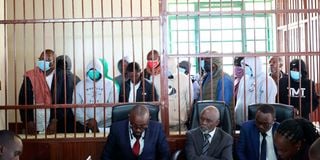Officers in killing of two Indians to undergo mental check

Former members of the disbanded Special Service Unit at Kahawa Law Courts in Kiambu County on October 17, 2023.
What you need to know:
- The Director of Public Prosecutions approved murder charges against the accused.
- Special Service Unit has previously been accused of murders and extra-judicial killings.
The 15 police officers who are accused of murdering two Indian nationals and a Kenyan will be detained until Tuesday to allow police to conclude investigations and subject them to mental assessment before taking the plea.
The officers, formerly attached to the now disbanded Special Service Unit under the Directorate of Criminal Investigations (DCI) are accused of killing Mohamed Zaid Sami, Zulfiqar Ahmed Khan and Nicodemus Mwania Mwange.
There have been claims that the two Indians were in Kenya as part of a digital team that was working for then Deputy President William Ruto ahead of the 2022 General election. Mr Mwange was the Indians’ logistics fixer.
However, the government has never disowned this narrative.
The three were killed barely a month to the 2022 General Election.
The accused — Peter Muthee, James Kibosek, Joseph Kamau, David Kipsoi, Joseph Mwenda Mbaya, John Mwangi, Hilary Limo, Stephen Matunda, Simon Gikonyo, Paul Njogu, Boniface Otieno, Elikana Njeru, Fredrick Thuku, John Wanjiku and Michael Kiplangat —appeared before Kiambu Deputy Registrar Jacqueline Karani.
The directive to have the 15 officers detained at Kiambu Prison came a day after the Director of Public Prosecutions approved murder charges against them.
Earlier, a damning affidavit filed in court detailed how the two Indians and their Kenyan taxi driver were tracked, abducted and later killed by the ex-members of the dreaded crack unit that has previously been accused of commissioned murders and extra-judicial killings.
Investigating officer Michael Kirui attached to the National Police Service, through a sworn affidavit filed in court, said that the two Indians and their Kenyan driver were marked men and it was only a matter of before they were to be killed.
The affidavit does not indicate the motive of the killings but sheds light on an alleged killer squad ready to pull the trigger and working closely with other rogue elements within the DCI
Mr Kirui detailed the roles played by the accused in executing the killings.
“It is believed that the first respondent (Mr Muthee) was the operations commander, planning and overseeing the abductions of Mohammed
Zaid Sami and Zulfiqar Ahmed Khan together with their taxi driver Nicodemus Mwania Mwange,” Mr Kirui says in court papers.
Mr Kirui told the court that preliminary investigations have shown that the second respondent was driving one of the motor vehicles that was used in abduction and ferrying the three to the killing field.
The third respondent (Mr Mwangi) is alleged to be the one who specifically drove the car that had the two Indians and their taxi driver to Aberdare forest where they were executed.
The fourth accused is alleged to have been part of the killer squad.
The prosecution team, in their submissions in court, said they analysed call data records, which revealed that the accused were in constant communication planning how to execute the murders.
“Call data records indicate that the first respondent communicated with the teams before, during and after the interception. He was also in communication late in the night with other persons of interest who are yet to be identified and it is believed he was briefing them on the operation,” prosecution documents filed in court state
“Preliminary investigations, including their vehicles GPS track logs and call data records place the respondents, their vehicles and other actors at the scene of crime and the possible location where the victims’ bodies were dumped,” Mr Kirui told the court




